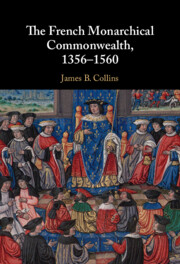Book contents
- The French Monarchical Commonwealth, 1356–1560
- The French Monarchical Commonwealth, 1356–1560
- Copyright page
- Contents
- Illustrations
- Preface
- Introduction
- 1 La chose publique de nostre royaume
- 2 Political Vocabulary in Action
- 3 Murder, Justice, and la chose publique in an Age of Madness
- 4 The Commonwealth under Siege
- 5 The chose publique and Urban Government
- 6 The Orléanist Offensive
- Conclusion
- Bibliography
- Index
3 - Murder, Justice, and la chose publique in an Age of Madness
Published online by Cambridge University Press: 05 May 2022
- The French Monarchical Commonwealth, 1356–1560
- The French Monarchical Commonwealth, 1356–1560
- Copyright page
- Contents
- Illustrations
- Preface
- Introduction
- 1 La chose publique de nostre royaume
- 2 Political Vocabulary in Action
- 3 Murder, Justice, and la chose publique in an Age of Madness
- 4 The Commonwealth under Siege
- 5 The chose publique and Urban Government
- 6 The Orléanist Offensive
- Conclusion
- Bibliography
- Index
Summary
Charles V’s early death endangered the monarchical system he created, because his adolescent son faced massive urban rebellions, focused on the unpopular indirect taxes Charles V had created. Not long after the monarchy surmounted that challenge, Charles VI’s descent into madness led to a civil war between the Orléans and Burgundy branches of the family. The civil war necessitated a renewed series of theoretical justifications for monarchical power. The concurrent debates about papal v. conciliar supremacy had particular resonance in France because of Jean Gerson’s key role both in French political life and in the debates within the Church.Writers such as Jean de Terrevermeille, who transformed the “Salic Law” from a rarely cited myth into a largely accepted “fundamental law,” and Christine de Pizan, who created an explicitly French metaphor of the body politic, would have a determining influence on the next two centuries of French political discourse. The political prominence of multiple women placed gender at the center of French politics in this period, a pattern that repeated in the transition to the new vocabulary of State, after 1560.
- Type
- Chapter
- Information
- The French Monarchical Commonwealth, 1356–1560 , pp. 110 - 146Publisher: Cambridge University PressPrint publication year: 2022

